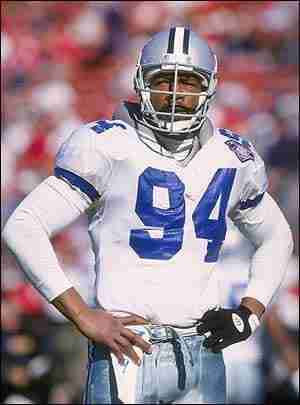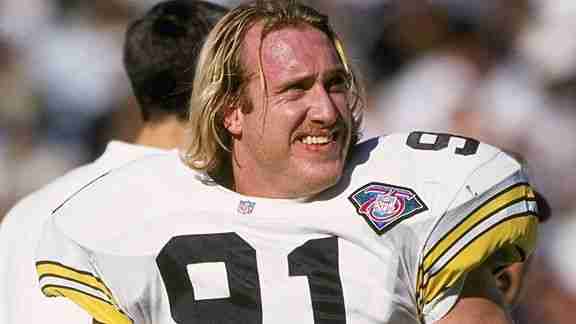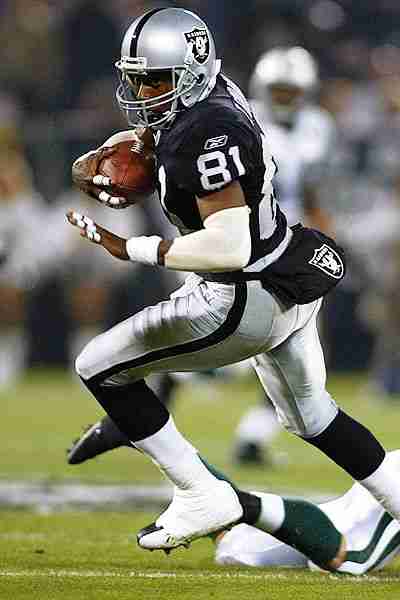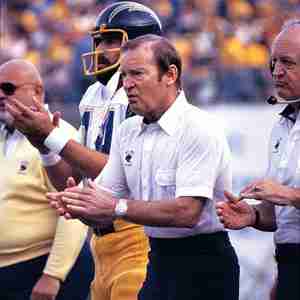
Committee Chairman
Kirk Buchner, "The Committee Chairman", is the owner and operator of the site. Kirk can be contacted at [email protected] .
Charles Haley: 2015 HOF Finalist
Jan 20, 2015
Published in
Hall of Fame Debates

Having a lot of fun doing our Baseball debates with two of my bloggers, DDT and the Phillies Archivist, I wanted to repeat the same idea with this year’s Football Finalists, but due to time constraints I will take a deeper look at each candidate myself and offer a few thoughts as to their Hall of Fame candidacy
Next, I take a look at former Defensive End and Linebacker, Charles Haley.
This is the sixth consecutive year that Charles Haley has been named a Hall of Fame Finalist, and every single time that someone extolls the virtues of Haley for enshrinement they point to the same thing every single time:
Five Super Bowl Rings.
And why shouldn’t they do mention that fact over and over again? There is no player who ever competed in the National Football League who can make that claim, and why else do you play the game if it isn’t to become a champion? Haley wasn’t just a bystander, he was a pivotal figure in these championship teams with both the Dallas Cowboys and San Francisco 49ers and is one of the few players who has over 100 Quarterback Sacks (100.5). That is the most important stat, and one you can’t not mention when looking at Haley’s Hall of Fame credentials.
Haley was also someone who had successful seasons at both Defensive End and at Linebacker, and went to the Pro Bowl and had First Team All Pro Selections at both positions, overall accumulating two First Team nods and five Pro Bowl selections, which again are decent numbers, though we have seen many other defensive players with five Pro Bowls who really have not come close to getting into Canton, though that is not what many think has kept him out so far.
As much as you would hear John Madden wax poetic about his skills on Sundays, you would equally hear about character issues that Haley had. The defensive standout, who would later be diagnosed as bipolar, was absolutely detested by the media and though that should not be a factor for Hall of Fame voting, it is voted on by humans who mostly have interacted with the people they vote on. The human factor plays a part, right or wrong.
It is not that he also did not ruffle teammates the wrong way as he famously had to be restrained from attacking Quarterback, Steve Young following a loss to the Oakland Raiders and this was not an isolated incident.
Still, there have been many past teammates, namely Troy Aikman and his former coach, Jimmy Johnson who have been vocal advocates of Haley getting into the Hall. That kind of support has to help though as much as he has become a finalist over and over, there never seemed to be any year where it felt that he was going to get over that hump.
This year doesn’t feel that much different either and it wouldn’t surprise me to see him fall short again.
Kevin Greene: 2015 HOF Finalist
Jan 18, 2015
Published in
Hall of Fame Debates

Having a lot of fun doing our Baseball debates with two of my bloggers, DDT and the Phillies Archivist, I wanted to repeat the same idea with this year’s Football Finalists, but due to time constraints I will take a deeper look at each candidate myself and offer a few thoughts as to their Hall of Fame candidacy
Next, I take a look at former Linebacker, Kevin Greene.
The Quarterback Sack is the sexiest defensive statistic in Football, and though the Interception is a far bigger game changer, the Sack defines the game. Despite the changing of the rules designed to protect the Quarterback, it remains an exciting play and the most coveting thing a Linebacker can get.
Kevin Greene recorded 160 of them.
Although the sack statistic is certainly aided by schemes and surrounding personnel, it is an impressive accomplishment and one that places him third overall behind Bruce Smith and Reggie White, both of whom were inducted into the Hall of Fame. Greene is also a two time leader in that category leading the National Football League in that stat in 1996 and 1998, the latter of which when he was 34 years old.
This bears mentioning, as though he was recording multiple sacks in his 20’s, he was a more complete player in his 30’s and it was this decade of his life where he was also recognized as one of the top defensive players of his time. Greene would be named the NEA Defensive Player of the Year in 1996, and would also be named the NFL Alumni Linebacker of the Year.
Greene would also be named to five Pro Bowls, two First Team All Pro nods and was also named to the 1990’s All Decade team, decent numbers and though many other Defensive players have been named to more Pro Bowls and All Pro squads, he wasn’t that far off from consideration in his early years.
Entering his fourth consecutive year as a Finalist, Kevin Greene again is not the highest profile Linebacker left and could easily be pushed aside for Junior Seau, and frankly if it comes down to picking only one Linebacker, it should be Seau, though Greene remains the top pass rusher on the ballot, a fact aided by Michael Strahan’s induction last year.
That is another factor that works against him, as he doesn’t have the same star quotient those other defensive players who got in recently, namely Strahan and Warren Sapp who got in the year before.
That shouldn’t matter, but though he did become a more balanced player later in his career, he is measuring up against others that were.
Kevin Greene should eventually get into the Hall of Fame, and probably should. Personally, the more I look at his career, the more I am swaying towards inducting him, as originally, I felt he was a bit too one dimensional. I will revert back to the word “eventually” because I don’t think he is getting in this year, but he won’t have to wait much longer.
Tim Brown: 2015 HOF Finalist
Jan 17, 2015
Published in
Hall of Fame Debates

Having a lot of fun doing our Baseball debates with two of my bloggers, DDT and the Phillies Archivist, I wanted to repeat the same idea with this year’s Football Finalists, but due to time constraints I will take a deeper look at each candidate myself and offer a few thoughts as to their Hall of Fame candidacy
Next, I take a look at former Wide Receiver/Returner, Tim Brown.
Tim Brown first became eligible for the Football Hall of Fame in 2010, and was named a Finalist that year, and has been every year since. Brown has some substantial Hall of Fame credentials but has been caught in a logjam of more deserving Wide Receivers namely Cris Carter and Andre Reed who had a bit of a wait themselves.
Again, Brown is not the highest regarded Wide Receiver who made the Finals as Marvin Harrison, who personally I was shocked when he was not a first ballot inductee last year, did not get in. Last year, when the Hall of Fame reduced from fifteen to ten names, Harrison made the final ten, and Brown did not, indicating that he is still not on the top of the wideout pecking order.
This is not to say that he is not a Hall of Famer caliber player, because he does have a lot on his resume. What he lacks in First Team All Pro Selections (he has none) and Super Bowl Rings, he makes up for in Pro Bowl selections (nine) and Special Teams credentials.
Brown’s first Pro Bowl was as a Special Team selection and in that rookie campaign he would lead the NFL in Kick Return Yards. He would later lead the NFL in Punt Return Yards in 1994 and overall would contribute a total of 4,555 Return Yards and 4 Touchdowns; a mark that no other Wide Receiver can state.
Does that matter?
It should, but as we know, the Pro Football Hall of Fame never has put a lot of premium on Special Teams players, so why should we expect that they will care about a Special Team “add on” to a Wide Receiver career?
Perhaps that is the problem, as Tim Brown’s Wide Receiving was decent, he was never ever considered among the top two in his position, and if he ever was at any given time, he could at least cling to that.
That does matter, as being considered an elite performer at an offensive skill position he would probably be indicted already. Just one season, in addition to his career statistical accomplishments would have made him impossible to overlook by this point.
Even with the inflated statistics that exist within Wide Receivers at this time, Tim Brown is still in the top five in Receptions and Receiving Yards and while he was able to successfully to climb the all time stat ladder, he still did so in an era where he had a lot of competition.
With his additional dimensions on Special Teams and his accumulated totals on Offense, he would receive my vote, and has waited long enough.
Saying that, I don’t think he will get the call this year either.
Don Coryell: 2015 HOF Finalist
Jan 17, 2015
Published in
Hall of Fame Debates

Having a lot of fun doing our Baseball debates with two of my bloggers, DDT and the Phillies Archivist, I wanted to repeat the same idea with this year’s Football Finalists, but due to time constraints I will take a deeper look at each candidate myself and offer a few thoughts as to their Hall of Fame candidacy
Next, I take a look at former Head Coach, Don Coryell.
This is actually the easiest debate as the Hall of Fame case for Don Coryell always comes down to the same question: Innovation Vs Success.
Seriously, it is that simple.
Coryell was dubbed “Air Coryell” for a putting a higher premium on the passing game, and creating a unique rhythm forcing defenses to cover all parts of the field. Tight Ends, Running Backs would go in motion, Receivers had no set start point, and the ball would be going to the target before the receiver would get there. Coryell made deep routes a major part of his offense and altered the way Tight Ends were played, making them a bigger part of offensive targets. All of this is commonplace today but this was not happening before Coryell literally changed the way the game was played.
He would begin this revolution with the St. Louis Cardinals where he would win two consecutive division titles, but it was in San Diego where he had the Quarterback he wanted (Dan Fouts) that he was really able to bring his vision to light. His Chargers would win the division three times and would lead the National Football League in passing six consecutive seasons, which remains a record today.
That’s the positive side of the Hall of Fame ledger, which has been enough to keep him on the ballot for a few years now; here is the negative.
Coryell did take his teams to the playoffs often but only has a 3 and 6 record and does not have any Super Bowl rings, generally a prerequisite for a Hall of Fame induction. His regular season record is 111-83-1, which is decent, but is not spectacular.
However, the biggest and fairest criticism of Don Coryell was his lack of attention to defense, and even past Defensive Coordinators would state that he had limited interest in that side of the ball. That did show in the teams he coached, as they were routinely on the bottom half of points and yards allowed.
So there you have it. The ultimate case of innovation Vs Accomplishment.
Personally, I am all about innovation, though my glasses are tainted somewhat by looking at other Halls of Fame and how they induct players/musicians and when you are a game changer, I believe you should get in.
Will he this year?
Probably not.

